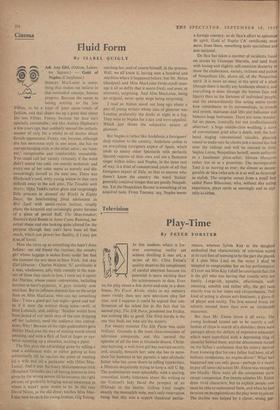Cinema
Fluid Form
By ISABEL QUIGLY Ask Any Girl, (Odeon, Leices- ter Square.) — Gold of Naples. (Cinephone.)
SHIRLEY MACLAINE is some- thing that makes me believe in that outmoded concept, human progress. Because she seems to belong entirely to the late Fifties, to be a kind of joint cause/result of fashion, and that cheers me up a good deal about the late Fifties. Funny, because her face isn't Specially memorable : not like Audrey Hepburn's a few years ago, that suddenly seemed the aesthetic answer (if only for a while) to all doubts about female appearance. Funny, too, because, although she has enormous style in one sense, she has no one unchanging style in the other sense : no 'man- ner,' recognisable and comfortably immutable. You could call her variety virtuosity if the word didn't sound too cold, too merely technical; and every one of her roles seems as warmly and dis- concertingly herself as the next one. There was Hitchcock's cool, witty young widow in that very difficult essay in the sick joke, The Trouble with Harry; IVkike Todd's rather glum and surprisingly little princess in Around the World in Eighty Days; the heartrending jilted adolescent in Hot Spell with social-realist haircut, cruelly plain; the kittenish and ravishingly pretty heroine of a piece of period fluff, The Matchmaker; Sinatra's dyed floosie in Some Came Running, her actual shape and size looking quite altered for the purpose (though they can't have been all that much, which just proves her fluidity, if I may put it so, of form).
Now she turns up as something she hasn't done before: our old friend the ingenue, the country girl whose luggage is stolen from under her feet the moment she sets them in New York. Ask Any Girl (director : Charles Walters; `U' certificate) is a neat, wholesome, jolly little comedy in the man- _ ner of those they made in (yes, I must say it again) the Thirties, whose comic conventions, including heroine-in-hero's-pyjamas, it guys amiably now and then. But its jolliness depends less on the script than on Miss MacLaine, who can say something like : '1 was a good girl last night—good and wet' as if it were the wittiest thing since—well, at least Lubitsch; and, adding : 'Mother would have been proud of me' (with shot of the rain dripping off her hatbrirn), send the audience into convul- sions. Why? Because all the right godmothers gave Shirley MacLaine the way of making words sound amusing, and with a flick of foot or linger or eye- brow summing up a situation, making a point.
The film guys the advertising game by selling a man a subliminal wife; or rather getting at him subliminally till he reaches the point of wanting (a) a wife and (b) a particular wife (Miss Mac- Laine). And it uses the hoary Shakespearean trick (Rosalind/Orlando, etc.) of having lessons in love given by the wrong person till he becomes the right person; of gradually bringing sexual awareness in where it wasn't quite meant to be. In this case David Niven, as the old drear, teaches Miss Mac- Lain how to catch his young brother, Gig Young;
catching her, and of course himself, in the process. Well, we all know it, having seen a hundred and one films where it happened before; but Mr. Niven (deadpan) and Miss MacLaine (wide-eyed) man- age it all so deftly that it seems fresh, and even, at moments, surprising. And Miss MacLaine, being an original, never quite stops being surprising.
I read an Italian novel not long ago about a pair of young writers whose idea of glamour was London, preferably the docks at night in a fog. They went to Naples for a day and were appalled. Which just shows the subjective nature of glamour.
But Naples is rather like Andalusia, a foreigners' shop window to the country. Andalusia cashes in on everything foreigners expect of Spain, which tends to annoy other Spaniards with perfectly Spanish regions of their own and not a flamenco singer within miles; and Naples, in the same sort of way, is a kind of concentrated puree of all that foreigners expect of Italy, so that to anyone who doesn't know the country the word 'Italian' generally conjured images that are purely Neapoli- tan. Yet the Neapolitan flavour is something of an acquired taste. From Tuscany, say, Naples seems
a foreign country; so de Sica's effort to epitomise its spirit, Gold of Naples ('A' certificate), must seem, from there, something quite specialised and non-national.
De Sica has taken a number of incidents, based on stories by Giuseppe Marotta, and used them with loving and slightly selfconscious dexterity to show the exuberance, variety, richness and pathos of Neapolitan life; above all, of the Neapolitan spirit. It is more an essay in the spirit of a place (though there is hardly any landscape about it, and everything is done through the human face and figure) than in the fortunes of individual -people; and the extraordinarily fine acting seems some- how subordinate to its surroundings, to crowds and streets, staircases and lifts and balconies and hideous huge bedrooms. There are some wonder- ful set pieces, ironically but not unaffectionately observed : a huge middle-class wedding; a scene of conventional grief after a death, with the hus- band staging conventional suicides, glancing round to make sure he climbs just a second too late over the railings and will be rescued in time. Sophia Loren, Neapolitan herself, seems authentic as a handsome pizza-seller; Silvana Mangano rather less so as a prostitute. The incomparable TotO is as moving as ever; the almost as incom- parable de Sica (who acts in it as well as directing) as stylish. The surprise comes from a small boy called Piero Bilancioni, who, without any acting experience, plays cards as movingly and as styl- ishly as either.










































 Previous page
Previous page